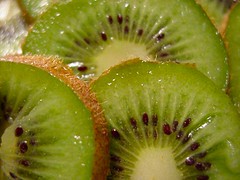We are all curious. If you are curious about what is healthy, this is my blog about it. Welcome!
Friday, April 24, 2009
Growing Hairloom Organic Seeds
Thursday, April 23, 2009
Eating Fish is not all that it's hyped up to be

When researchers from Wake Forest University School of Medicine in Winston-Salem, N.C., recently analyzed the DHA content of 30 different kinds of wild and farmed fish, they made a startling discovery. Something in certain farmed fish was a little off. Most notably, the fats in farmed tilapia, the second most popular farmed fish in the world (right behind farmed Atlantic salmon), may not be as anti-inflammatory as they could be. Why? In the wild, tilapia eats plenty of DHA from plants. But when farmed, the food these fish are supplied with contains less of these valuable fats, so you get less of them, too.
- Eat more fish, eat less fish.
- Don't eat this particluar fish because of contamination.
- Eat more of a particular fish because of the beneficial fats.
- Don't eat this fish because it's too depleted, or for environmental reasons.
- Pay attention to the way the fish was raised caught (wild, farmed, source) since it effects it's nutritional properties
Monday, April 13, 2009
Planting our garden, starting composting

Almost all yard waste can be added to your compost.
leaves grass clippings twigs branches weeds vines thatch garden plants flowers unused potting soil and mix straw Much of your food waste can be composted.
egg shells coffee grounds tea leaves and bags vegetable and fruit scraps and peels corn cobs stale bread and cereal nut shells flour rice oatmeal Other items that you can compost include:
human hair feathers small amounts of wood ash wood chips dead insects vacuum bag contents What shouldn't I compost?
Some items either do not degrade well, attract insects and pests, or might contain diseases or chemicals that would contaminate the compost.
meat poultry seafood dairy products diseased plants human and pet feces (including kitty litter) mayonnaise salad dressing peanut butter lard other fatty items
Friday, April 3, 2009
Kohlrabi Turnips and Kiwi

These little sputnik-shaped vegetables come in green or purple, can be eaten raw or cooked, and taste a lot like broccoli stems. Kohlrabi is often mistakenly referred to as a root vegetable, but in fact it grows just above ground, forming a unique, turnip-shaped swelling at the base of the stem.
- Good source of Thiamin, Selenium, Folate, Magnesium and Phosphorus, Vitamin C, Vitamin B6, Potassium, Copper and Manganese.
- Also root vegetables, such as beets and carrots, are packed with fiber and powerful antioxidants, like cartonoids and betacyanin, which protect against cancer by inhibiting cell mutations. And these anti-cancer properties are also found in other fruits and veggies, like nuts, beans, peppers, tomatoes, oranges and especially leafy greens, such as broccoli and watercress.
- High in Vitamin C, Manganese, Vitamin B6, Folate, Calcium, Potassium and Copper

- Good Source of Vitamin E, Potassium and Copper, and a very good source of Vitamin C and Vitamin K.
